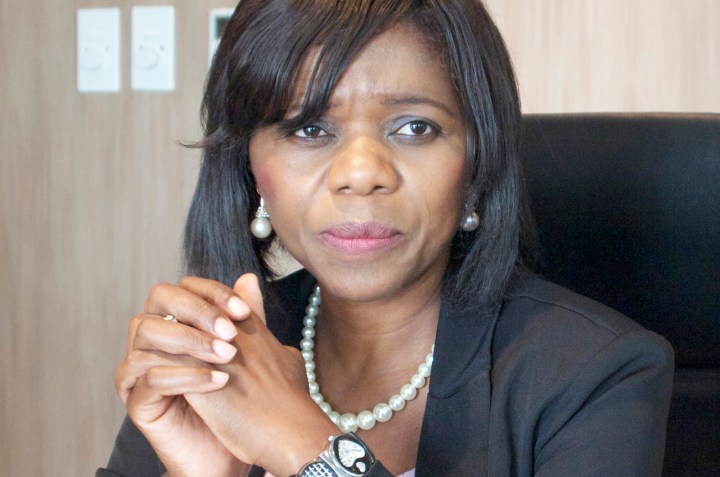Politics
Thuli Madonsela, 2011 South African Person of the Year

Daily Maverick names Public Protector Thuli Madonsela the 2011 South African Person of the Year for serving her role as an ombudsman to the exercise of executive power with unwavering commitment to truth. In the process, she restored the South Africa's faith in democracy and justice for all. By SIPHO HLONGWANE and GREG NICOLSON.
Five elders from Vhembe district sit respectfully in their tweed jackets in a back row of the function room in the public protector’s national office in Hillcrest, Pretoria. Their concern, a pension fund complaint, is not the main attraction at the press conference and few of the journalists approach the gentlemen who have travelled from Venda. They sit in well-pressed suits, old enough to have seen the days of apartheid, and wait for Madonsela to tell them the truth.
The journalists, however, have come to hear the public protector expose Gauteng’s only DA-controlled municipality as equal to its jaded ANC counterparts, perceived as rife with corruption and mismanagement.
After the public protector’s colleagues are introduced, Madonsela, needing no introduction, takes the centre chair on the panel. She wears a royal blue suit, ironically the colour of the official opposition party, and matching pearl earrings and necklace.
The gentlemen from Vhembe, along with journalists, sit silently as she reads her report – “It can’t be right: remedying self-interest in Midvaal”. She doesn’t raise her voice and is careful to avoid anything outside the advocate’s remit of investigation and evidence. The gentlemen from Vhembe struggle to focus through the legal definitions as Madonsela reads her investigation, almost word for word. It’s hardly the charged language of political pressers, but the audience listens intently for the information beyond the stinging wit and false promises of their politicians.
Watch: Thuli Madonsela finds the DA-run Midvaal municipality guilty of maladministration:
Compared to the other press conferences where Madonsela released bombshell reports, the Midvaal one received a tame reception, a brief flurry of media coverage and not much more. There were no editorials howling for Midvaal mayor Timothy Nast’s blood. And Madonsela herself didn’t receive the gratuitous back-patting that she’d got after releasing the report on the police headquarters lease controversy. What was going on here? Was the so-called liberal media slightly prickled by the revelation that the only DA-held municipality in Gauteng wasn’t squeaky clean? Or does the country simply not care about maladministration when it is not committed by the African National Congress?
Though few would have acknowledged it at the time, this was the sign, the last piece in the mosaic, that demonstrated that this was a public protector who would take on anyone who wasn’t doing their jobs properly, political leanings be damned.
More than anything, Madonsela’s tenure has slowly patched together the public’s faith in the institution. Previously, the courts were the only recourse anyone took seriously in the face of administrative belligerence from the executive arm of government. The problem with the courts is the cost of lawyers (in this respect, you really get the justice you pay for) and thus they remain almost the exclusive recourse of the moneyed.
The public protector is still largely viewed as a corruption buster du jour. That is what tends to happen when you release reports excoriating two cabinet ministers and a police commissioner, while recommending that the president “take the appropriate action”, which he eventually does by wielding his sword at the fingered culprits.
For many, the public protector’s report on Gwen Mahlangu-Nkabinde, Sicelo Shiceka and Bheki Cele would have been their first real introduction to the institution and its power.
But the public protector is, at heart, an ombudsman.
“Anti-corruption is actually a multi-agency concern. There’s us, there’s the Special Investigating Unit, there’s the Hawks and there’s the Public Service Commission. When we are the serious anti-corruption agency, it is where members of the executive are involved, because the Public Service Commission cannot get involved,” Madonsela says.
Watch: Building procurement lease flawed – Thuli Madonsela:
We’re sitting in her private boardroom; she speaks with a soft, bashful cadence which belies her superhero image.
“I was more interested in the small person’s case, that this office repositions itself as a real alternative to court when it comes to administrative justice cases,” she says. “At the level of outreach, we are getting more cases, but at the level of national dialogue, I always still think that we have become more famous as an anti-corruption agency, but that is not our core function.”
She tells of people coming to her office and begging her to look at their personal cases just as soon as she found time between tackling corrupt cabinet ministers.
She laughs, “The idea is that people shouldn’t call us and feel that their case is in insignificant. People should know that our default responsibility is towards them, so that they don’t have to go to court, or a petitions committee in Parliament.”
Born in Johannesburg in 1962, Madonsela began her career in the early 1980s as a teacher, before she became involved in union work as an advisor for the National Union of Printers and Allied Workers. She completed a bachelor of arts in law at the University of Swaziland, and an LLB at the University of Witswatersrand in 1990. In 1990, she was the Independent Electoral Commission’s presiding officer. When the new Constitution was drafted, she was appointed as one of 11 technical experts. After that, she worked in a variety of parastatal bodies and trusts before becoming a director at the Waweth Law and Policy Research Agency, which she owns.
In 2009, President Jacob Zuma appointed her as the new public protector.
More than educating people about the access they have to her office, Madonsela sees a need to let the public know that, actually, her powers are substantial. Section 181 of the Constitution, which creates a number of institutions to “strengthen constitutional democracy in the Republic”, prescribes powers that allow the office to investigate any concerns about maladministration or improper conduct in any sphere of government (save for the court decisions). The public protector is only answerable to the Constitution and the law. Though it must submit a yearly report to the National Assembly, the office is not accountable to Parliament for any rulings it makes.
The idea of a public protector came to South Africa by way of Sweden. In 1810, the King of Sweden Charles XIV John anointed a Parliamentary ombudsman to be his eyes and ears among the people, to gauge how the civil service was treating the Swedish citizenry. The office was also supposed to – and still does – function as a conscience for the public service in relation to how it exercised its power.
Despite the powers of her office, Madonsela has chosen not to exercise them to their fullest extent when seeking the enforcement of a certain rule. For her to force the president’s hand would be to undermine the democracy. Such an action would undermine the entire culture of democratic and constitutional compliance. Those directed by the public protector to take certain actions must comply out of a sense of duty, not a begrudging sense of fear.
In fact, the absence of a culture of compliance is one of the reasons why Madonsela describes corruption as being “endemic” in the executive wing of government, during the interview.
“We haven’t reached the levels of West Africa where nothing gets done without an encouragement fee,” says she. “But when corruption has become properly endemic, you can even forget about the judiciary. Because once corruption becomes endemic, it permeates every institution, including the judiciary, where you can’t think that your case will go according to the law but rather to the one who pays more money. So yes, it’s endemic but it hasn’t reached tragic proportions.”
Watch: Thuli Madonsela on the role and importance of Africa’s public guardians:
The other reason why corruption has dug in so deeply has to do with how we run the government. There are simply too few brains operating. As a result, there is little control and even less knowledge in what the law requires, leading to a failure of internal compliance systems.
“Internal audit [in government departments] has failed a little bit because we are experiencing what people are now beginning to call a capacity deficit. Even the auditor general says that he’s looking at increasing the capacity of the team,” Madonsela says. “There’s a problem around institutional memory. People are coming in and out all the time and many of them don’t understand the systems, so I think corruption is aided by a lack of awareness on what should be happening. I would say it is a capacity deficit instead of incompetence.
“A lot of people are new, so if you are new as a minister, whatever your staff says should be done, is done. It is time we thought about a career civil service again. At the beginning of 1994 there was a need to transform the civil service, to bring new people in laterally, but perhaps it’s time now that we avoid lateral entries. It’s 17 years into democracy”, she says.
Madonsela herself has not been able to avoid controversy. Soon after releasing the report on the police headquarters lease, she was accused of tender malfeasance. As it turns out, an agency she owns had been approached by the justice department on both occasions for help, which she has always been happy to provide. At the time, she was a commissioner on the Law Reform Commission.
The public protector is also a known expert in the law, race and gender, and her company sold a book which she had written on the topic to the justice department for R50,000 and nowhere near the reported R500,000.
The way that the matter came out in The Star was particularly hurtful, says Madonsela. “When I looked at what happened and how ugly it has become, maybe I should have instructed the person running my company to release the book to CNA or Exclusive Books and have justice buy it from there.”
She shrugs off the suggestion that her work may be dangerous. She’s always lived her life in the knowledge that she’ll die someday. And killing her wouldn’t stop her work. What she does is prescribed by the Constitution. The next person who came in would simply continue where she had ended off. The remedy will ultimately be rewriting the Constitution.
Madonsela does concede that her work has made her children a little paranoid.
Despite having a record of public service longer than some of the presidents we’ve had, Madonsela says that her role has always been that of an advisor. From her days as a teacher, to being a technical expert during the drafting of the Constitution, as a law reformer and finally a public ombudsman, Thuli Madonsela has always been on the people’s side. In 2011, she reminded us once again to believe that the Constitution will always be bigger than anything thrown at it, as long as it is guarded by committed people. DM
Read more:
- ANALYSIS: Zuma appoints a new Public Protector, will this one have teeth in Daily Maverick;
- Madonsela finds maladministration, but not actual corruption, but cop saga will go on in Daily Maverick;
- Madonsela’s riveting report: Shiceka wasted our money on luxury. And he lied in Daily Maverick.
Photo: REUTERS







 Become an Insider
Become an Insider